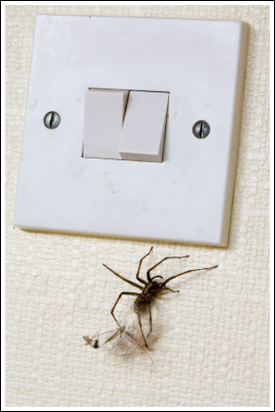Flying Insects
Fabric Pests
Rodents
Spiders
 Pest-Gone, LLC your NJ pest control exterminator is trained to both federal and state standards in providing you an effective approach to spider control and spider exterminating in NJ to either your home or business, using the most eco-friendly methods available for spider control and spider exterminating in NJ. When it comes to effective spider removal in NJ trust in a locally based pest control company in New Jersey with over two decades of experince and settles for nothing less than 100% customer satisfaction.
Pest-Gone, LLC your NJ pest control exterminator is trained to both federal and state standards in providing you an effective approach to spider control and spider exterminating in NJ to either your home or business, using the most eco-friendly methods available for spider control and spider exterminating in NJ. When it comes to effective spider removal in NJ trust in a locally based pest control company in New Jersey with over two decades of experince and settles for nothing less than 100% customer satisfaction.
When we come out to your home we will do a thorough inspection prior to treatment and help point out any spider control problems within your home. Many times treating ones home from the outside can help eliminate spiders from the inside helping you have more success for permanent spider removal from inside your home. Pest-Gone, LLC also offers a year round protection plan which covers you for spider control and exterminating year-round allowing you peace of mind all year. So don't hesitate and let the top exterminators in NJ take care of your spider pest control problem today!
Call Pest-Gone, LLC NJ Pest Control to speak to a Spider Control Professional today at 732-356-0024
“We Always Guarantee our Work”
Please read below to learn more about spider control and spider extermination in NJ:
Spiders are generally categorized as either web spinners or hunters depending on how they catch their prey. Hunting spiders wander around searching for their prey or hunt by laying in ambush. The more insects there are inside a building, the more likely it is to have spiders living there. Spiders also like to find refuge in warmer buildings as the nights cool off in the fall.
All spiders are carnivorous and with few exceptions have poison glands. They have spinarets used for making webs to snare their prey, but some actually roam around hunting for victims. Webs may be used to make homes, lacing leaves or grass together, and they also may be used to bind their catch.
The Jumping Spider attaches a strand just before jumping-a type of lifeline so as not to jump too far into a place where it may have difficulty in getting out. Eggs are encased in webbing, usually in a sac, which is then hidden under bark or rocks, kept in a nest, fastened in the snare web, or carried around (like the Wolf Spider). Some never even see their offspring, some protect the eggs until they hatch, and the Wolf Spider even carries the young around until they can hunt on their own. Spiders feed by removing the internal liquid contents of their prey with their Chelicera (fangs).
